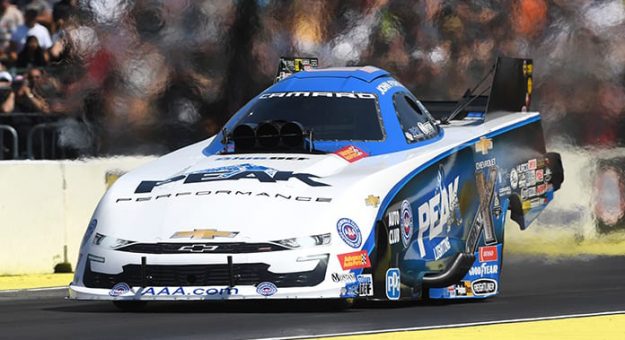SNOHOMISH, Wash. — Jason Fiorito knew it didn’t make sense — at least not financially.
But keeping Pacific Raceways, the Northwest’s premier multi-use motorsports facility, open this year seemed right morally.
“If we were making a strictly business decision, we would send everybody home and close the gates. The events with no spectator sales or very few spectator sales just don’t make financial sense,” Fiorito said. “But in times like this, when people are so desperate for something to do, I just can’t close down, right? Part of what we do is providing a venue for people to get out and stay mentally healthy.
“So our crew and my family have made the decision we’re just going to bite the bullet and stay open. But there’s really no good financial reason to do it. The participant-only events are painful financially.”
One method Fiorito is using to stay afloat admittedly isn’t ideal: “As a family, what we’re doing is just robbing from our other businesses that haven’t felt the pinch and feeding (the race track). And, hopefully, this is the last year we have to do it.”
However, he understands the reality of the situation.
“Honestly, we’ve been talking to the NHRA, and does anybody really believe that by midsummer Washington State is going to be unrestricted for large spectator events, like no restrictions on the Seattle Mariners, Seattle Seahawks, (University of Washington) Husky football, and us?” he asked. “It’s far-fetched at best to assume that that many people would be immunized and we would be in an unrestricted state by midsummer. We’re doing everything we can and we’re trying to remain optimistic.”
Pacific Raceways was one of 14 race tracks to lose a 2020 NHRA Drag Racing national event as pandemic-related causes shrank the season from 24 races to 11. Speedway Motorsports Inc., which traditionally hosts six races among its four venues, lost five of them last year.
Public-health restrictions linger along with the virus itself, keeping a number of drag strips uncertain about this year’s likelihood of resuming operations.
“The situation hasn’t really changed a lot,” Fiorito said. “We’re in Phase 3 now. That gives us 25-percent capacity on spectator events — if you follow all the protocols — like you can only have groups of eight that come from only two households, temperature check on the way in, six-foot front and back and side-side, in-between groups of eight in the grandstand, limited to 100 people total in the open seating areas. If you figure out all the protocols that have to go on, you really can’t get to 25-percent capacity.
“We’re able to host our weekly stuff and our participant stuff,” he said, “but we’re still in the position where we’re not able to host any of the big spectator events.”
That means the NHRA Northwest Nationals, Street Outlaw No-Prep Kings races and HondaFestNW — the facility’s biggest draws — are in limbo.
“We were down 60-percent gross revenue last year and if things don’t improve dramatically this year, that’s probably going to be a similar situation,” he said.
Fiorito is one of the lucky ones.
This month’s Lucas Oil Southern Nationals will be the 40th and last at Atlanta Dragway. The familiar urban-sprawl that claimed such historic tracks as Orange County Int’l Raceway, Lions Drag Strip, Ontario Motor Speedway and Fremont Dragstrip in California and, much later, New Jersey’s Old Bridge Township Raceway Park, has hit the Southeast.
The land at the Commerce, Ga., strip has been earmarked for “redevelopment opportunities.” Route 66 Raceway and its sister track, Chicagoland Speedway, are shuttered for the year and despite track president Scott Paddock’s prepared statement that included assurance that it “will continue to operate as an integral part of our community,” he also said, “It’s difficult at this time to speculate on what 2022 might bring.”
The NHRA already has postponed the storied Winternationals Auto Club Raceway in Pomona, Calif., and removed the event at Arizona’s Wild Horse Pass Motorsports Park from the schedule.
At least Fiorito has options. For several years, he has spearheaded an automotive and design technology campus that’s centered on the existing multipurpose motorsports facility. It features 1.2 million square feet of commercial space for a technology-based and racing-related industry aimed at establishing hundreds of clean-tech jobs and producing accelerated automotive innovation.
The forward-thinking project — which has the working title of Pacific Innovation Center — is, frankly, a brilliant move to keep Pacific Raceways relevant and provide economic and environmental stability.
In essence, Fiorito is fashioning his own, controllable urban sprawl, as it were — all while cementing a relationship with Seattle, King County and Washington State in their efforts to grow as a high-tech hub and Pacific Rim player.
Pacific Raceways is poised to become more than simply a noisy neighbor.
“The sustainability of our track is tied to the commercial development,” Fiorito said.
Not every track operator has Fiorito’s momentum. But with the growing problem of illegal street racing, which too often is mistaken for drag racing, these race tracks are serving as lifesavers available for communities across the country.
